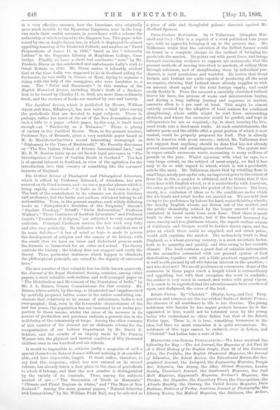Farm - Produce Realisation. By D. Tallerman. (Simpkin. Mar- shall and Co.)—This
is a reprint of a work published four years ago, with an appendix bringing it up to the present day. Mr. Tallerman urges that the salvation of the British farmer would be found in a complete change in the method of bringing his goods into the market. He points out with great force, and brings- forward convincing evidence to support his statements, that the present methods of moving live-stock to markets, of selling them through salesmen, and of slaughtering them by individual pur- chasers, is most pernicious and wasteful. He insists that Great Britain and Ireland are quite capable of producing all the meat we require, showing that Ireland alone already supplies us with an amount about equal to the total foreign supply, and could easily double it. From the moment a carefully cherished bullock leaves his farm, the process of waste and deterioration begins, and during a long railway journey and exposure in market, amounts often to 5 per cent. at least. This might be almost entirely avoided by the adoption of local centres for combined slaughtering, where cattle might be sent from surrounding districts, and where the carcasses would be graded, and kept in refrigerators for use as required,—by, in short, turning the live- meat trade into a dead-meat trade. At such establishments, the inferior parts and the edible offal, a great portion of which is now wasted, could be properly prepared for food. This is already done in America with great success ; indeed, Mr. Tallerman does not suggest that anything should be done that has not already proved successful and advantageous elsewhere. The system now in vogue entails enormous waste, amounting to many millions of pounds in the year. Whilst agreeing with what he says, to a very large extent, on the subject of meat-supply, we find it less• easy to do so with regard to wheat, which is not a perishable, article like meat. Mr. Tallerman shows that by retailing flour in small bags, nicely put-up for sale, an improved price to the extent of from 15s. to 20s, a quarter is obtained, and he thinks that if this were done with English wheat, as it is undoubtedly with American, the extra profit would go into the pocket of the farmer. But here, surely, is a confusion of ideas as to the conditions under which the wholesale and retail trades are carried on. We are told that owing to the preference by bakers for hard, water-drinking wheats, the starchy English wheats are driven out of the market, and the public shamefully robbed by the larger amount of water contained in bread made from such flour. That there is much truth in this view we admit ; but if the demand increased for more starchy and less glutinous wheats, the superb mellow wheats of California and Oregon would, be further drawn upon, and the price at which these could be supplied, and not retail prices, would still regulate the market. The melancholy truth is, that England, as a wheat-growing country, is a most uncertain factor,. both as to quantity and quality, and this owing to her variable climate. The book contains a great deal of valuable information on the anomalies connected with our present system of food distribution, together with not a little practical suggestion, and is well worth perusal by all who take an interest in the question,— and who does not P We are all producers or consumers. Some of the sentences in these pages reach a length which is extraordinary and appalling, but with that exception the work is readable ; the author is very much in earnest, and writes with great vigour.. It is much to be regretted that the advertisements have overflowed upon, and disfigured, the cover of the book.


































 Previous page
Previous page